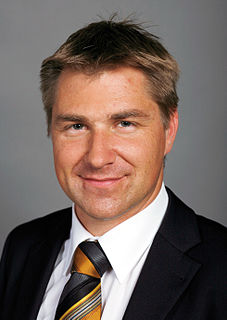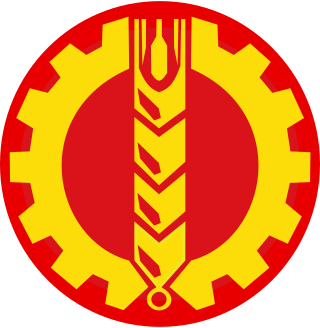The politics of India takes place within the framework of the country's constitution. India is a federal parliamentary democratic republic in which the President of India is the head of state and the Prime Minister of India is the head of government. India follows the dual polity system, i.e. a double government that consists of the central authority at the centre and states at the periphery. The constitution defines the organisational powers and limitations of both central and state governments, and it is well-recognised, rigid and considered supreme; i.e. the laws of the nation must conform to it.

The United Democratic Party (UDP) is one of the two major political parties in Belize. It is the ruling party, having won the 2008, 2012 and 2015 general elections. A centre-right conservative party, the UDP is led by Prime Minister of Belize Dean Barrow.

The 1959 United Kingdom general election was held on Thursday, 8 October 1959. It marked a third consecutive victory for the ruling Conservative Party, now led by Harold Macmillan. For the second time in a row, the Conservatives increased their overall majority in Parliament, to 101 seats over the Labour Party led by Hugh Gaitskell. The Liberal Party led by Jo Grimond again returned only six MPs to the House of Commons, but managed to increase their overall share of the vote to 5.9%; compared to just 2.7% four years earlier. To date, the 1959 general election marks the only occasion since the Second World War when a government has managed to increase its overall majority while seeking a third term in government. However, despite this electoral success; the Conservatives failed to win the most seats in Scotland, and have not done so since. This election marks the beginning of Labour's domination of Scottish seats at Westminster, which lasted until the rise of the Scottish National Party at the 2015 general election. Both future Liberal leader Jeremy Thorpe and future Conservative Party leader and eventual Prime Minister Margaret Thatcher first entered the House of Commons at this election.

Indonesia held legislative elections on 5 April 2004 for both houses of the People's Consultative Assembly, the country's national legislature. This included all 550 seats in the People's Representative Council and 128 seats of the new Regional Representative Council.

The National Congress of Brazil is the legislative body of Brazil's federal government. Unlike the state Legislative Assemblies and Municipal Chambers, the Congress is bicameral, composed of the Federal Senate and the Chamber of Deputies. The Congress meets annually in Brasília, from 2 February to 27 July and from 1 August to 22 December.
The Autonomist Liberal Party, renamed usually semplified in Liberal Party in 1898, was one of major parties from 1910 until the Cuban Revolution the late 1950s, when it was exiled.

The National Assembly is the lower house of the Parliament of South Africa, located in Cape Town, Western Cape Province. It consists of four hundred members who are elected every five years using a party-list proportional representation system where half of the members are elected proportionally from 9 provincial lists and the remaining half from national lists so as to restore proportionality.
Elections in the Republic of India constitution include elections for the Parliament, Rajya Sabha, Lok Sabha, the Legislative Assemblies, and numerous other Councils and local bodies.

Philippine elections are of several types. The president, vice-president, and the senators are elected for a six-year term, while the members of the House of Representatives, governors, vice-governors, members of the Sangguniang Panlalawigan, mayors, vice-mayors, members of the Sangguniang Panlungsod/members of the Sangguniang Bayan, barangay officials, and the members of the Sangguniang Kabataan are elected to serve for a three-year term.

Myanmar is a unitary republic, with elected representatives at the national and, state or region levels. On the national level, the head of state, the President, is elected indirectly through an Electoral College. According to the 2008 constitution, the term durations of the legislature, the President, and the Cabinet are five years.

Elections in Namibia gives information on election and election results in Namibia.

Elections to the United States House of Representatives were held in 1832. They were held concurrently with the 1832 presidential election, in which Democrat Andrew Jackson was reelected.

The National Assembly of the Gambia is the unicameral legislature of the Gambia. The authorisation for the National Assembly lies in Chapter VII of the Constitution of the Gambia. It is composed of 53 members directly elected through first past the post, and a further five members appointed by the President.
The Nigerian National Assembly delegation from Kano comprises three Senators and fifteen Representatives. They form the legislature of Kano State, Nigeria.
The Elections for the House of Representatives of the Philippines were held on May 11, 1998. Held on the same day as the presidential election, the party of the incumbent president, Fidel V. Ramos' Lakas-NUCD-UMDP, won majority of the seats in the House of Representatives. For the first time since the People Power Revolution, a party won majority of the seats in the House; Lakas had a seat over the majority. This is also the first Philippine elections that included the party-list system.
Federal elections were held in Czechoslovakia on 8 and 9 June 1990, alongside elections for the Czech and Slovak Assemblies. They were the first elections held in the country since the end of Communist rule seven months earlier, and the first free elections since 1946.

General elections were held in Myanmar on 8 November 2015, with the National League for Democracy winning a supermajority of seats in the combined national parliament. Voting occurred in all constituencies, excluding seats appointed by the military, to select Members of Assembly to seats in both the upper house and the lower house of the Assembly of the Union, and State and Region Hluttaws. Ethnic Affairs Ministers were also elected by their designated electorates on the same day, although only select ethnic minorities in particular states and regions were entitled to vote for them.

Federal elections were held in Switzerland on 18 October 2015 for the National Council and the first round of elections to the Council of States, with runoff elections to the Council of States being held in various cantons until 22 November.

General elections were held in Trinidad and Tobago on 7 September 2015. The date of the general elections was announced by Prime Minister Kamla Persad-Bissessar on 13 June 2015. The result was a victory for the opposition People's National Movement, which received 52% of the vote and won 23 of the 41 seats in the House of Representatives.
















